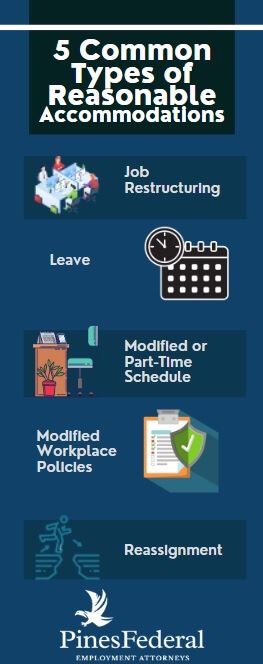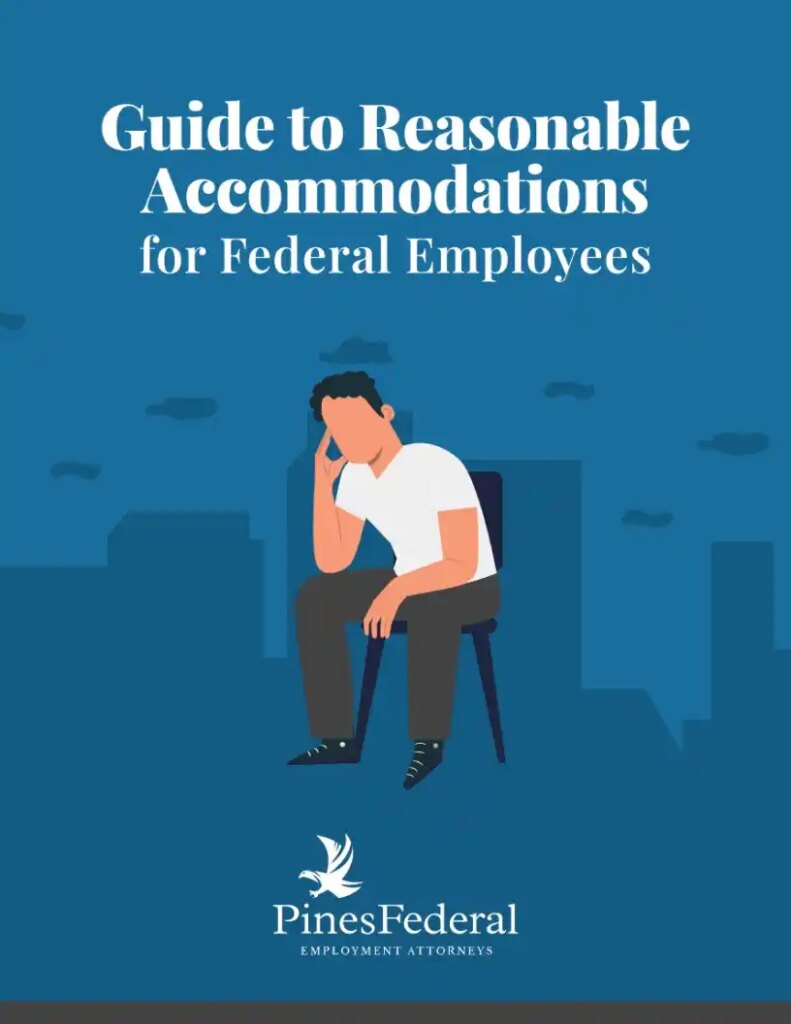
Congress passed the Americans with Disabilities Act (ADA) in 1990 to protect the rights of people with various disabling conditions. One key provision of the ADA requires private-sector and public-sector employers to provide reasonable accommodations both to qualified job applicants and current employees.
In combination with the Rehabilitation Act of 1973, the ADA makes workplace accommodation something that every employee with a disability has a right to request. That said, reasonable accommodations at work can come in all shapes and sizes.
Read on to learn more about reasonable accommodations inside the federal workplace. This article will also touch on several reasonable accommodation examples.
For a consultation with one of our experienced federal reasonable accommodations lawyers, please call (800) 801-0598 or fill out our online form today.
What is a Reasonable Accommodation?
Disabled federal employees with mental or physical disabilities can request reasonable accommodations in the workplace. A reasonable accommodation is any change in the work environment or the way a job is carried out that creates equal employment opportunities for disabled people.
Rights for disabled individuals were first established by the Rehabilitation Act of 1973. Subsequent laws like the ADA and the Americans with Disabilities Act Amendments Act (ADAAA) significantly expanded the rights of federal employees with disabilities. These laws require employers to provide reasonable accommodations to workers depending on the severity of the disability and other factors.
Under the ADA, an employee is “disabled” if they meet one of the following three situations:
- The employee has a physical or mental impairment that substantially limits one or more of their major life activities;
- The employee has a “record” of such an impairment; or
- The employee is regarded by others as having an impairment that substantially affects one or more major life activities.
And what are major life activities? Almost anything.
As the Department of Labor relates, the current definition of major life activities include:
- Caring for yourself,
- Hearing,
- Walking,
- Sleeping,
- Eating,
- Working,
- Communicating,
- Thinking,
- Dressing yourself,
- Bending,
- Lifting,
- Performing any kind of manual task, or
- Seeing.
One of the reasons Congress passed the ADAAA in 2008 was that many employers consistently argued that certain disabilities weren’t actually “disabilities.”
These legal fights led to multiple Supreme Court decisions that significantly limited employees’ rights. By passing the ADA, Congress made clear that an enormous number of conditions should qualify as disabilities.
[DOWNLOAD] Reasonable Accommodations for Federal Employees

Can Agencies Reject My Reasonable Accommodation Request?
Current federal law makes it difficult for employers to casually reject a reasonable accommodation request. In fact, reasonable accommodations can only be denied if they will cause undue hardships. As the Equal Employment Opportunity Commission has related, the phrase “undue hardship” does not mean merely any difficult or inconvenient request.
Another thing to remember is that employers cannot make sweeping judgments about a large group of employees, even if those employees have similar disabling conditions or reasonable accommodation requests. Instead, the ADA and the Rehabilitation Act require employers to judge each reasonable accommodation request on a case-by-case basis.
Employers have to consider such factors as the employee’s core job duties, the employee’s general position, and their capabilities. In all cases, there should be an interactive discussion between the employee and the employer about potential accommodations.
How Does Someone Request a Reasonable Accommodation?
Thankfully, employees don’t need to use any magic words or fill out a stack of forms to request accommodation. Instead, all an employee needs to do to request a reasonable accommodation is ask in “plain English.”
In other words, if you tell your employer that you keep coming to work late because of ongoing medical treatments for a condition you have, you have just made a request for reasonable accommodation. You can also have a family member, legal representative, or friend make a request for you.
Five Common Types of Reasonable Accommodations for Employees
There are an enormous number of potential reasonable accommodations employees can receive. However, most accommodations fall into five categories.
Those categories are:
- Job Restructuring,
- Leave,
- Modified or Part-Time Schedule,
- Modified Workplace Policies, or
- Reassignment.
Let’s explore these accommodation types in more detail.
Job Restructuring
A common type of reasonable accommodation is job restructuring. Job restructuring includes modifications such as reallocating or redistributing job functions that an employee is unable to perform because of a disability. It also includes altering when and how a function is performed.
For instance, if a federal firefighter develops a problem with their vision, they may be excused from minor job tasks, like driving a forklift or a fire truck. Alternatively, the employer of an office clerk with severe speaking difficulties could assign them to work at the back of the office rather than at the customer service desk.
Leave
Another common type of reasonable accommodation requested is the use of accrued paid leave or unpaid leave. An employer does not have to provide paid leave beyond what is already provided to similarly-situated employees. Employees with a disability should exhaust their accrued paid leave first before requesting additional unpaid leave.
An employee with a disability may request leave for various reasons, including:
- Obtaining medical treatment,
- Recuperating from an illness,
- Avoiding temporary adverse working conditions,
- Training a service animal, or
- Receiving training to learn sign language, etc.
Because there are many different possible situations that need accommodation, employees can request many different kinds of leave. Perhaps an employee needs six weeks off to deal with chemotherapy treatments. Or maybe they need only every other Thursday afternoon off.
Modified or Part-Time Schedule
An employee may request a modified schedule as a reasonable accommodation.
A modified schedule may involve:
- Adjusting arrival or departure times,
- Allowing an employee to work the night shift or morning shift,
- Providing periodic breaks,
- Altering when certain functions are performed,
- Allowing an employee to use accrued paid leave, or
- Providing additional unpaid leave.
An employer must provide a modified or part-time schedule when required as a reasonable accommodation, absent undue hardship, even if it does not provide such schedules for other employees.
Featured Case Result
WHAT HAPPENED: Our attorney negotiated a $100,000 settlement for a medical provider who was not provided telework as an accommodation due to their medical disabilities preventing long commutes to work.
Modified Workplace Policies
It is a reasonable accommodation to modify a workplace policy when needed by a worker with disabilities. However, reasonable accommodation only requires that the employer modify the policy for an employee who requires such action because of a disability; so, the employer may continue to apply the policy to all other employees.
As an example, let’s pretend that Mary, a cashier, is diagnosed with poor circulation. Because of her condition, she has to sit 30 minutes for every hour of standing. Even if Mary’s employer prohibits cashiers from sitting during their work, they would have to modify that policy and allow Mary to sit so that her physical requirements could be met at work.
Reassignment
If an employee with disabilities is unable to perform their current role adequately because of their health’ limitations, they can request reassignment to a vacant position unless the employer can show that it would be an undue hardship.
The employee must be “qualified” for the new position. They must have the skill, experience, and education needed to perform the new position’s essential functions–with or without reasonable accommodations.
When Can a Reasonable Accommodation Be Requested?
According to the Rehabilitation Act, a reasonable accommodation can be requested at any time. Additionally, the request can be given either orally or in writing. Once requested an employer has an obligation to act on the requested changes in a timely manner.
If you need help filing a reasonable accommodation, our federal employment law attorneys are here to assist you. Contact us online or call (800) 801-0598 today to schedule a consultation!